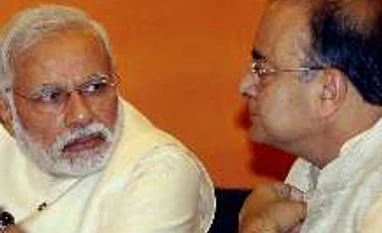Major subsidies, which account for 96 per cent of the total subsidy outgo, are in fact seen rising marginally to Rs 2,46,397 crore this year from Rs 2,45,451 crore (RE) for last year. Of these, the food subsidy is seen jumping 25 per cent to Rs 1,15,000 crore, primarily on the implementation of Food Security Act provisions. At the same time, petroleum subsidy is budgeted to decline 26 per cent to Rs 63,426 crore in the current fiscal against Rs 85,480 crore last year.
The Budget has pinned its hopes on a “two-pronged strategy”, borrowed directly from the United Progressive Alliance government’s administration, to cut subsidies. These include targeting subsidies through Aadhaar-linked Direct Benefits Transfer and raising diesel prices by 50 paisa every month since January this year. The decline in petroleum subsidy is due to the lower requirement of compensation by the oil marketing companies (OMCs) on sale of petroleum products.
The government will continue with the policy of calibrated increases in diesel prices, leaving the rest on hopes that international crude oil price will not offer major shocks as a result of the turmoil in Iraq and Syria. “It is expected that the gap between administered price and market price of diesel would be eliminated by early FY2014-15. Thereafter, both petrol and diesel would be deregulated and linked to market prices,” the Budget’s Medium Term Fiscal Policy Statement said.
The government controls the retail selling price of diesel, kerosene and domestic cooking gas to insulate consumers from the full impact of high international crude prices. This results in the incidence of under-recoveries to the OMCs which are then partly compensated by the government. The Budget provides for Rs 59,836.95 crore for this purpose.
This Budget’s petroleum subsidy also includes Rs 3,590 crore for freight subsidy for far-flung areas and supply of natural gas to the north-eastern region.
The only new intervention on subsidy reform in the Budget was the decision to set up an Expenditure Management Commission for expenditure reform that will submit its initial report later this year.
The Budget also prescribed pricing reforms in the urea sector, with an immediate price correction of this liberally used fertiliser, as an “urgently required” measure. In the long-term, the government will ensure increased domestic production to cut costly imports of fertilisers and stabilise prices. The government is reported to be considering raising urea prices by 10 per cent, the first major price increase in four years, in a step that could impact food prices.
)